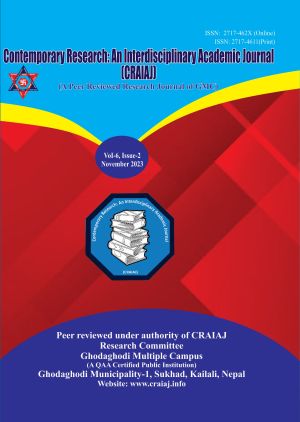India - Nepal Foreign Relations in the Context of Economics: Late 20th- Early 21st Century
DOI:
https://doi.org/10.3126/craiaj.v6i2.60257Keywords:
Bilateral trade, Economic relations, Foreign policy, India, International relations, NepalAbstract
In the context of the economy, India's foreign policy toward Nepal is defined by a complicated mix of cooperation and rivalry, with both nations attempting to strike a balance between their different interests while navigating a variety of political, economic, and strategic problems. Through a number of initiatives over the past few years, including the extension of a line of credit to support infrastructure development, the creation of an India-Nepal Joint Economic Commission, and the promotion of cross-border trade and investment, India has sought to deepen its economic ties with Nepal. These efforts have been aimed at boosting economic growth and development in Nepal while enhancing India's regional influence. However, India's foreign policy towards Nepal has also faced criticism, with some arguing that it prioritizes its own interests over Nepal's. This has led to tensions between the two countries, with Nepal seeking to diversify its economic and diplomatic ties beyond India. In this study, the trade, investment, aid, and tourism relations between India and Nepal are examined. It looks at how the economic hegemony of India and Nepal shaped the two countries' economic ties. The study also looks into the challenges and opportunities for the India-Nepal economic partnership. It investigates the issues related to trade barriers, infrastructure development, and energy cooperation. Additionally, this study examines the impact of political and diplomatic factors on the economic relationship between India and Nepal. The research is based on a combination of primary and secondary sources, including interviews with key stakeholders, economic data analysis, and a review of relevant literature. The findings of this study suggest that the economic relationship between India and Nepal has been significant and mutually beneficial, but there are several challenges that need to be addressed to realize the full potential of the partnership. Overall, this study offers insights into the prospects and challenges for deepening the economic relationships between the two countries as well as a better knowledge of the economic aspects of India-Nepal foreign relations.
Downloads
Downloads
Published
How to Cite
Issue
Section
License
Copyright (c) 2023 Ghodaghodi Multiple Campus, CRAIAJ

This work is licensed under a Creative Commons Attribution-NonCommercial-NoDerivatives 4.0 International License.
© Ghodaghodi Multiple Campus, Research Committee, RMC

This work is licensed under a Creative Commons Attribution-NonCommercial-NoDerivatives 4.0 International License. This license enables reusers to copy and distribute the material in any medium or format in unadapted form only, for noncommercial purposes only, and only so long as attribution is given to the creator.




